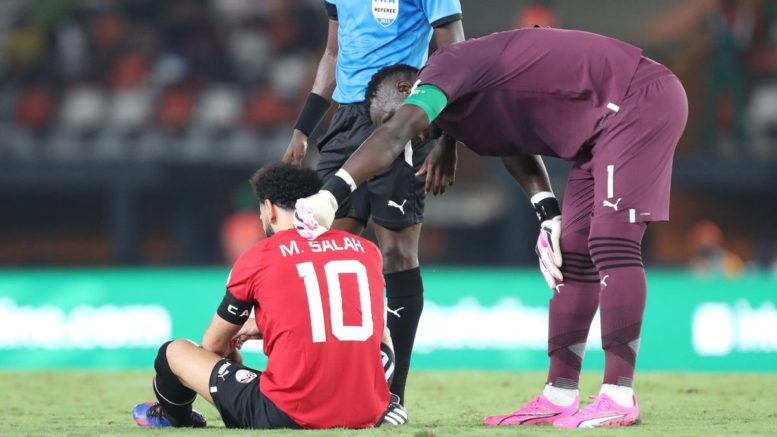As if on cue, one of soccer’s biggest stars on one of the world’s biggest clubs went down with injury in the Africa Cup of Nations. While there’s not a diagnosis yet, Mohamed Salah limped off just before the half in Egypt’s draw against Ghana on Thursday. This comes a day after Kylian Mbappé warned of NBA-style load management coming to soccer (as if it weren’t already happening). Between club and national team obligations, soccer is a year-round sport, with some managers afforded the gift of depth more than others.
Since Liverpool hasn’t come close to figuring out what to do when Salah is out of the lineup, all of LFC’s pricey acquisitions amount to butt, and the team currently sitting atop the English Premier League can ill afford to be without its king anymore than it has to as Manchester City is menacingly gaining ground in the rearview. I’d argue that the physical ask in professional soccer is second only to tennis, and there’s a real reason that, historically, players north of 30 shrivel up like children left in the bath too long. Salah is 31.
Load management assumes that fans want their favorite players playing at as high a level as possible for as long as possible. There are obvious monetary motivations for a long career — Kawhi Leonard just signed a $152 million extension which he likely doesn’t get if not for preserving his body — so a lot of it is just business. Some might argue playing games is the business, and lengthy careers are potentially a bad thing for sports (I have), but let’s pretend the first sentence of this paragraph is true. In order for Salah to keep doing the things that he does for five to 10 more years, he must be used strategically.
That means all tourneys outside of the EPL — your FA and Carabao cups of the world, as well as Europa and Champions leagues, even national team duties — should be optional, if not scrapped altogether. If you want to toss in fixtures against clubs in the bottom tier of the EPL, there’s a case to be made for that, too.
The catch is a lot of managers roll out their B squads in those situations already. Obviously, there’s not a lot of rest to be had in the Champions League, or national team tournaments like the World Cup or the Euros, but for the most part, the less sociopathic managers try to be cautious with their vital players when possible.
While the Premier League race might be closer if Man City (re)moved its back row every now and then, Pep Guardiola only tinkers with his lineup out of boredom. (City also possess the kind of depth that lets Pep mostly get away with a guy like Kevin De Bruyne missing the first half of the calendar.)
However, for as much as fans say they want parity, the ratings tell a different story. Stars are polarizing, and the more divisive the personality, the better. LeBron James is still a great player and even if he was on the Roger Clemens “show up for half a season and pitch for a contender” schedule, the NBA is more profitable when James is on a roster. As long as he can put up 20, 8 and 8 when he’s on the court, let him rest 30 nights a season.
If soccer leagues were paying attention, they’d welcome Mbappé and other stars managing their loads. So what if fans pay hundreds of dollars and get a Lionel Messi-less Inter Miami. They still paid hundreds of dollars for non-refundable tickets. Load management only affects those who obsess over sports and pay for League Pass or Peacock to watch every game. They’re identity is so wrapped up in the organization that it’d take an intervention to quit.
Plus, the segment of the population at risk of being off put — aka people who can only afford to go to a game once or twice a year — work so much that they forget why they stopped going to the stadium in the first place. They’ll be back because it’s either that or “quality time” cooped up in some shanty with their families.
The key to load management is normalizing it for the public. The timing of Salah’s injury and Mbappé’s warning were the first steps. Us freaking out about it is the next.
Original source here
#Soccers #load #management #time





